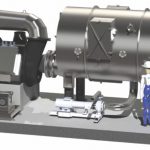It is Now Time to Recognize Circular Low Carbon Forest-Based Industries as a Strategic Value Chain
March 10, 2020

The Green Deal has to be translated into a business case, strengthening sustainable and circular industrial value chains in Europe, and ensuring that they are considered of strategic importance.
For that reason, CEPI, on behalf of the European Paper Industry, applauds the increased support to low carbon value chains in the “New approach to industrial policy” released by the European Commission on March 10, 2020.
“With the proper regulatory framework, the European paper industry together with the forest-based industrial value-chain can become one of the main forces driving the transition to a competitive, low-carbon and circular economy” said Jori Ringman, CEPI Director General.
With the proper regulatory framework, the European paper industry together with the forest-based industrial value-chain can become one of the main forces driving the transition to a competitive, low-carbon and circular economy
– Jori Ringman, CEPI Director General
As reported in the press release, the European paper industry is already working together with the Forest-based value-chain, to deliver products made from sustainable, circular and regenerative raw materials to European consumers and export markets.
CEPI also recognize the importance of the new governance method of building inclusive partnerships, making sure that national authorities and industry work closely together. Member States and the EU have to accompany the industrial transition to climate neutrality by securing clean and affordable energy for all industrial sectors with the adequate infrastructure – it is a prerequisite for deep emission reductions.
As an industry deeply committed to recycling, CEPI also recognizes that the Circular Economy Action Plan published today 11 March goes in the right direction by identifying key areas to enhance recognition of sustainable products and by incentivizing waste policies that will close existing gaps in the recycling loops.
We support a reinforced waste policy in support of circularity and agree with the identification of packaging as a priority sector for the Circular Economy Action Plan.
Design for recycling is a pre-requisite for the circularity of fiber-based products. We are fully engaged in improving the future recyclability of paper products with recommendations such as the European “Paper-based Packaging Recyclability Guidelines”. Applying these guidelines will allow the entire value chain to innovate on packaging functionality while keeping the recyclability of paper packaging in mind, as a core preoccupation.
It the same spirit, we launched the new fiber-based value chain alliance 4evergreen, a forum to engage and connect industry members from across the fiber-based packaging and food service value chain, from paper and board producers to packaging converters, brand-owners and retailers, technology and material suppliers, waste sorters and collectors, and more. The common objective of 4evergreen members is to deliver a holistic approach to optimize the sustainability and circularity of the fiber-based packaging’s life cycle.
In the context of recent waste import restrictions by China, the European paper industry is set to recycle even more in Europe, as it makes additional investments in paper recycling capacities. The paper industry is already recycling 49 million tonnes of paper in Europe (2018 data) and the amount has been growing since 2000. For the investments to happen, the European paper industry material must be separately collected and reach the mills with the right level of quality.
Therefore, the Circular Economy Action Plan correctly identifies the facilitation of EU internal shipments of waste and secondary raw materials as well as the convergence of waste collection systems as priorities.
We look forward to taking full advantage of the new industrial strategy and circular economy action plan. Concretely, this means manufacturing sustainable forest-based solutions made from renewable raw materials, making our production processes even more efficient and our value chains perfectly fit for a climate-neutral Europe.



